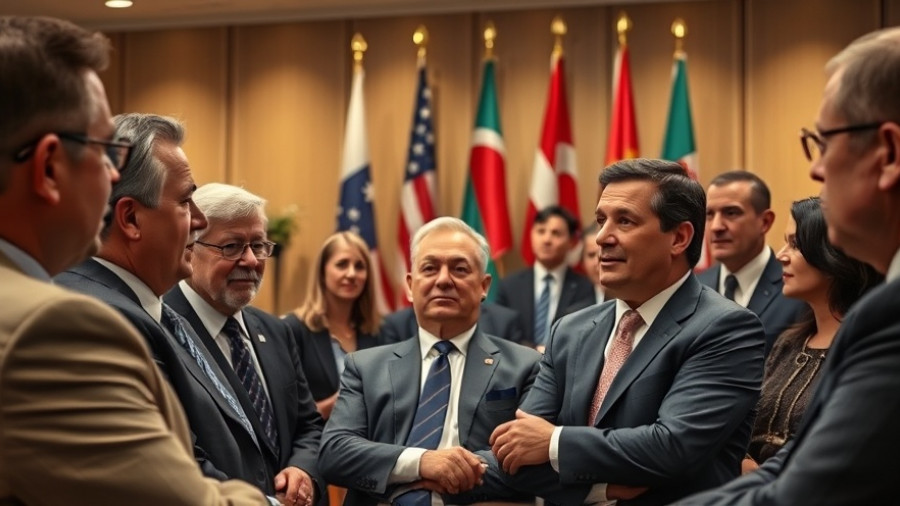
Can Ukraine Reclaim Its Lost Territories?
Amid ongoing tensions between Ukraine and Russia, discussions around military support have reached unprecedented levels. Recent dialogues between notable leaders, including President Trump and President Zelensky of Ukraine, have prompted a variety of questions regarding the future of territorial claims and military capabilities. When asked whether Ukraine could eventually reclaim its lost territories, President Trump remarked on the unpredictable nature of warfare, stating, "War is very interesting. You never know, do you?" This acknowledgment of the unpredictability surrounding military engagements sets the stage for further exploration of the implications of supplying advanced weaponry like Tomahawk missiles to Ukraine.
In 'Trump and Zelensky discuss Tomahawk missiles in US meeting', the leaders highlight the critical need for military support amidst ongoing conflict, prompting us to analyze the broader implications of such discussions.
Tomahawk Missiles: A Double-Edged Sword?
The provision of Tomahawk missiles to Ukraine, while potentially leveling the playing field against Russian forces more equipped in nature, comes with serious considerations. According to President Zelensky, the introduction of such missile systems could equalize the military capabilities between Ukraine and Russia, enabling a stronger negotiating position. However, the American military’s own needs for these missiles, especially in the event of conflict, raises a fundamental question: At what cost should these weapons be provided? President Trump emphasized the importance of maintaining a strong arsenal in the U.S. while expressing hope that the war in Ukraine could end swiftly without further escalation. This delicate balance of providing necessary support while also safeguarding national interests is a key consideration for both leaders.
Broader Geopolitical Implications
The discussion also touched on the geopolitical landscape, including the positions of nations like India and Hungary, who have been historically reliant on Russian oil. Trump mentioned that India was beginning to reduce its oil consumption from Russia, indicating a potential shift in alliances, while expressing understanding for Hungary’s geographical constraints. This highlights the crossroads at which many countries find themselves as they navigate the complexities of economic dependence versus geopolitical allegiances. Increased cooperation among these nations could potentially allow for a more unified front against aggression, thereby influencing the balance of power within the region.
The Human Cost of War
As military strategies unfold in tandem with political negotiations, the human cost of the ongoing conflict must remain central to the discourse. Both leaders acknowledged the devastating toll the war has taken, with President Trump noting that "we're losing thousands of people a week." This underscores the urgency of resolving the conflict, as both military and civilian lives hang in the balance. Zelensky's reference to the high number of abducted children, with estimates ranging between 20,000 and 300, serves as a haunting reminder of the war's impact on innocents and the necessity of immediate actions to end the violence.
Innovative Approaches to Military Collaboration
In a notable exchange, discussions on military collaboration extended to drone technology, with President Zelensky suggesting a potential tactical trade-off between drone supplies from Ukraine and Tomahawk missiles from the U.S. This cooperative venture illustrates a modern approach to warfare where cutting-edge technology plays a pivotal role in achieving strategic military objectives. As both nations explore avenues for collaboration, it's clear that military partnerships will continue to evolve, driven by the pressing need for effective defense solutions in a rapidly changing global landscape.
Final Thoughts: The Path Forward
The dialogue surrounding Tomahawk missile provisions and other military support for Ukraine is emblematic of the broader tensions and complex geopolitical dynamics currently at play. As officials work to navigate these treacherous waters, it is evident that the stakes are high—not just for Ukraine and Russia, but for the entire international community. The outcomes of these discussions may ultimately influence global political alignments, economic dependencies, and the overarching quest for peace. As signaled by President Trump: "We are in it to get the war over," there remains hope that through dialogue and cooperation, a resolution can be reached sooner rather than later.
What emerges from these discussions is not just a necessity for military aid, but an impetus for a comprehensive understanding of the intricacies involved in foreign relations and international conflict—the kind of knowledge that aids budget-conscious individuals and families in the UK to make informed decisions about local versus global impacts on their lives.
 Add Row
Add Row  Add
Add 




Write A Comment